
Report 2: Support for a Canadian “Vaccine Passport”
Series | COVID-19 Vaccine Skepticism in CanadaIntroduction
As people are vaccinated, life will change. Vaccines provide protection against the worst effects of COVID-19, especially mortality. In some cases, vaccines will make people with the virus less contagious. These are remarkably positive outcomes. But other aspects of life will change slowly and unevenly.
Until a sufficiently large part of the population is vaccinated, preventive measures like social distancing and masking will need to be maintained. The cycle of opening and closing some services and sectors will likely continue. Importantly, those who are not vaccinated will likely need to take greater precautions. On the basis of uneven risks of infecting themselves and others, there may be a case for denying services to those who are not vaccinated, at least for a time.
The speed with which reopening can happen may depend on allowing vaccinated individuals to access services that non-vaccinated people cannot. Would Canadians support this?
One idea that has been widely discussed and is beginning to be piloted in some jurisdictions is the notion of a “vaccine passport.” A vaccine passport allows those who have proof of vaccination access to services that those who are not vaccinated are not allowed. There are ready precedents for such measures. For example, outside of a narrow set of exceptions, children in public schools in some Canadian provinces are required to be vaccinated against various diseases. Similarly, international travellers to 21 countries are expected to show inoculation against yellow fever, for example.
While a vaccine passport system could have a few benefits, such as increased safety for people accessing services, slower transmission of the virus and greater incentives for vaccination, there are at least three obstacles to such a system.
First, there are major issues of fairness as vaccines roll out slowly. Second, there are important questions of implementation—how would a vaccine passport be issued and verified? A simple paper-based proof of vaccination is possible, while a more sophisticated method would be the creation of a centralized database, perhaps maintained by provinces. Third, there is the issue of citizen consent. Would Canadians support such a passport? That is the main question taken up in this short report.
In this report, I explore levels of support for a vaccine passport and a verification database, show how this support varies by sector and region, and explore the differences between individuals in the reasons they support or oppose vaccine passports. I conclude with three observations about a path forward for vaccine passports.
Data
This study relies on data collected through the Media Ecosystem Observatory, a collaborative effort of three research sites—the Centre for Democracy, Society, and Technology and the Social Dynamics Lab at McGill University, and PEARL at the University of Toronto. MEO was born out of the Digital Democracy Project, of which PPF was an early funder and champion. Since the third week of March 2020, MEO has conducted more than 60,000 interviews of Canadians in over 33 waves of data collection, all focused on the social and political contexts and implications of the COVID-19 pandemic. A longer description of our research strategy is available at www.mediaecosystem.com.
The data presented here were collected in our thirty-third wave, from February 2-7 2021. We have 1497 effective respondents, balanced by age, gender, and region. Respondents were recruited by Dynata to a survey hosted on the Qualtrics platform. Iterative proportionally fitted weights are generated using levels from the Canadian census.
Analysis
To begin, we consider support for organizations using proof of vaccination as a basis for service. Our specific question was: “Once the COVID-19 vaccine is available to everyone, should the following organizations be allowed to limit their in-person services to those who have been vaccinated?” We asked this about nine types of organizations.
The share of Canadians who would support the limiting of service by each type of organization is shown in Table 1.
Table 1: Support for a vaccination requirement by sector
| Sector | Yes (%) | No (%) |
| K-12 schools | 55 | 45 |
| Universities | 55 | 45 |
| Child care centres | 59 | 41 |
| Non-essential retail business | 53 | 47 |
| Non-essential service oriented business | 55 | 45 |
| Government agencies | 52 | 48 |
| Airlines | 65 | 35 |
| Recreation and athletic facilities | 61 | 39 |
| Essential businesses | 47 | 53 |
Our data show that support varies from a low of 47% for essential businesses, to a high of 65% for airlines.
In sum, there is majority support for vaccine requirements, though it is not overwhelming, and it does not vary greatly from sector to sector. Where it does vary, it does so sensibly. The less essential a service—the more accessing the service is a choice rather than a necessity—the more likely individuals are to believe vaccines should be required for entry.
Second, we asked respondents if they believe that if there were a central vaccination database kept by provinces, which businesses could query to see if an individual was in fact vaccinated. [1] Support for such a database is shown in Table 2.
Table 2: Support for a vaccination verification database by sector
| Sector | Yes (%) | No (%) |
| K-12 schools | 56 | 44 |
| Universities | 53 | 47 |
| Child care centres | 55 | 45 |
| Non-essential retail business | 34 | 66 |
| Non-essential service oriented business | 35 | 65 |
| Government agencies | 64 | 36 |
| Airlines | 58 | 42 |
| Recreation and athletic facilities | 41 | 59 |
| Essential businesses | 39 | 61 |
The ability to access a central record on vaccinations is much less supported than simply requiring vaccines for services, with an overall average of 48%.
Additionally, this support varies much more, ranging from one third (34% and 35%) for non-essential businesses to two thirds (64%) for government agencies.
Figure 1 – Support for a vaccine passport and database by sector
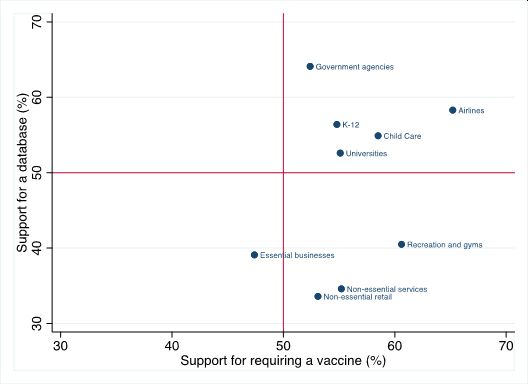
Of course, these beliefs are related to one another in important ways. Figure 1 plots these averages together. The figure has been divided into four quadrants. Sectors that fall in the bottom-left quadrant (essential businesses) lack majority support for requiring a vaccine and being able to access a vaccination database. Sectors that fall in the bottom-right quadrant (non-essential retail and services, and gyms) have majority support for requiring a vaccine, but not for being able to access a central vaccination database. Finally, five sectors fall in the quadrant of having majority support for a vaccine and majority support for being able to verify a vaccine via a database. These sectors are all either public (government agencies and K-12), semi-public (childcare and universities), or highly regulated (airlines).
Figure 2 – Support for a vaccine passport and database by region
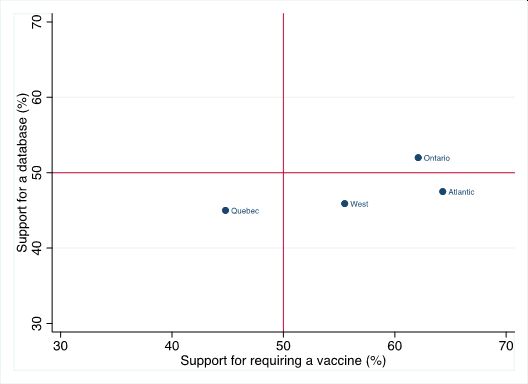
Beliefs about vaccine passports and verification vary not only by sector, but also by region. Figure 2 shows the distribution of support across four regions in Canada (the West, Ontario, Quebec, and Atlantic). Ontario is the only region in which there is, on average, majority support for all sectors requiring a vaccine and having access to a vaccination database. For respondents in the West and Atlantic Canada, there is on average majority support across sectors for requiring a vaccine, but not for a vaccination database. Only in Quebec is there not majority support for requiring a vaccine and for providing access to a vaccine database.
Figure 3 – Support for a vaccine passport and database by region, public sectors only
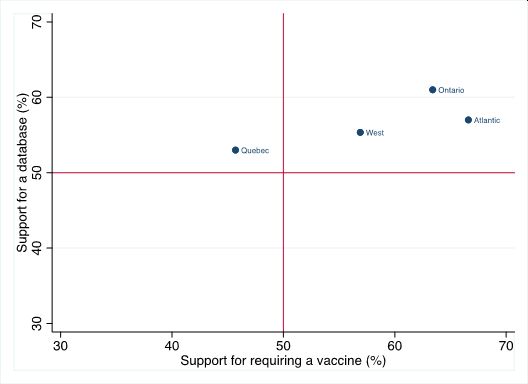
As we saw in Figure 1, views differ by sector, with public/semi-public sectors receiving more support both for vaccine mandates and a vaccine database. Figure 3 explores regional opinion differences when analysis is restricted to the five public or semi-public sectors (childcare, K-12, universities, government services and airlines). Here, we see that there is majority support for both requiring vaccines and giving access to a vaccine database in Ontario, the West, and Atlantic Canada. In Quebec, there is not majority support for requiring a vaccine, but there is majority support for providing access to a database.
Who supports vaccine passports?
Who supports vaccine passports? In figures 2 and 3, we present results of models estimating support for passports and verification databases among our respondents. In this analysis, we consider several different factors concurrently, including demographics, views of and responses to COVID-19, and underlying political and psychological differences between people.
Beginning with demographics, we estimate the effects of age and gender. On COVID-19, we measure five properties: a respondent’s general concern about COVID-19, their belief that it represents a threat to themselves, their belief that it represents a threat to others and the degree to which they are engaging in a suite of social distancing behaviours. Finally, we measure five different political and psychological constructs. Anti-intellectualism captures an individual’s belief that experts should not be trusted and their advice not followed. Conspiratorial beliefs captures of a set of commonly held beliefs by that current events and politics are controlled by a small conspiring set of individuals. Left-right ideology is a self placement on a ten-point left right scale. News exposure measures how many different sources of news an individual consumes. Finally, science literacy captures a respondent’s basic knowledge about well-known scientific concepts.[2]
Figure 4 – Individual-level predictors of support for a vaccine passport
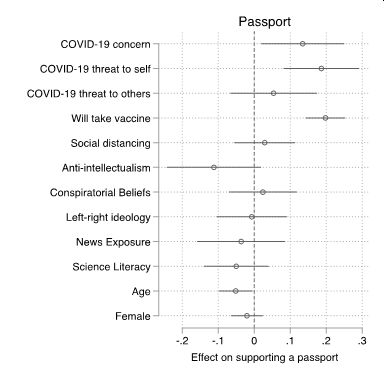
Figure 5 – Individual-level predictors of support for a verification database
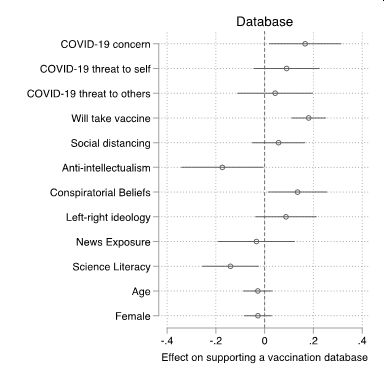
Figures 4 and 5 plot the results from multiple regression models of individual-level support for vaccine passports and a vaccination database. Circles present the estimated effect on opinion. These correspond to changes in the probability (measured 0-1) of supporting or opposing the outcome. Estimates to the right of the vertical zero line suggest the factor increases support, while estimates to the left suggest it decreases support. The horizontal lines are 95% confidence intervals, so only those lines that do not cross the 0 line can be considered statistically significant.
Beginning with requiring vaccines, the story is overwhelmingly one about concern over COVID-19.
Those who are more concerned about COVID-19 and who believe it presents a threat to themselves are more likely to support a vaccine passport.
Moreover, those who indicate that they will take a vaccine when it becomes available are also more likely to support a vaccine passport. Indeed, their likelihood of support is fully 20% higher. No other factors, except age, matter. In that case, we find that older respondents are somewhat less likely to support a vaccine passport, but the effect is not large. Our oldest respondents are ~5% less likely to support a vaccine passport.
Support for a database shows similar patterns, with two important differences. In that case, those who are concerned about COVID-19 and who intend to take a vaccine are more likely to indicate support for a vaccination verification database. Support is markedly lower among those who express both anti-intellectualism (an effect of ~18%) and those who have low scientific literacy (~16%). In this case, age has no effect.
Overall, then, the individual-level story is principally one of concern over COVID-19. It is not one in which ideology or news exposure matter. Support for vaccine passports and verification databases has little to do with politics and ideology, and much more proximally to do with how seized an individual is by the COVID-19 crisis, and the risks it presents to them and, to a lesser degree, others.
Implications
On balance, there is mixed support for a vaccine passport. There is often majority support, but not overwhelmingly. And support for a verification database lags that of a passport. Policymakers who wish to implement a passport have some distance to go in persuading citizens of the merits of such an approach.
Citizen consent is not the only obstacle, of course. There would also be substantial questions of implementation. I do note one promising area, however. Our data suggest that there are five sectors in which there is greater support both for a passport and for verification. In two of these sectors—K-12 and childcare—there is already a precedent of both requiring vaccines and verifying them. Airlines similarly have extensive experience in verifying that individuals meet various public health requirements before boarding. Ensuring people were vaccinated prior to boarding would not be beyond scope for them.
What about universities and government services, then? For universities, there may be some challenges in certifying vaccination, but presumably proof of vaccination could be required along with other paperwork that occurs at the beginning of every year. It need only be done once.
This leaves only governments. Whether they are able to implement the data infrastructure to track vaccination at an individual-level is an open question. There is not a strong track record here, but now would be the time to take seriously the opportunity and obligation to implement better data infrastructure. Certainly, there would be some support from citizens.
Footnotes
- Practically, imagine a database which attached a vaccination record to your SIN, or some other personal identification number that was randomly generated or selected by an individual. Service providers could then ping the database to see if the individual was vaccinated. ↑
- A complete description of all measures is available in the appendix of the following paper: https://osf.io/agm57/↑
Thank you to our partners
NSERC
University of Toronto, PEARL
Trottier Foundation
Johnson & Johnson
Media Ecosystem Observatory









